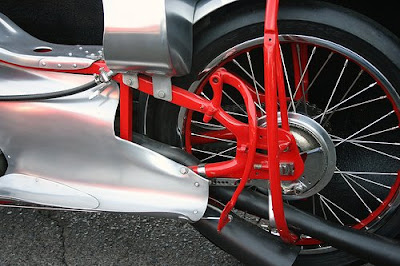A dive bomber that had ditched in Lake Michigan on a training run in 1944 was brought to land Friday for restoration in Florida for the National World War II Museum in New Orleans. The Douglas SBD Dauntless lifted from the water Friday to a pier in Waukegan, Ill., is among 130 to 300 or more planes estimated to have sunk in the lake during training late in World War II.
The Dauntless is the 35th airplane plucked from the waters since the National Naval Aviation Museum began a recovery and restoration program in 1990, Ellis said.
Even the wooden antenna mast was intact, and the rest of the plane was in good shape despite decades in the water, Lyssenko said.
"Finding World War II aircraft that actually have a combat record is a rarity," Ellis said. "We have a number here. The one that we loaned the World War II Museum has a combat record, so we wanted it back. We said, `We'll loan this one to you and we'll recover and restore another one which we'll then swap out when the restoration is finished.'"
An anonymous donor paid for the work.
"It costs about a quarter-million dollars to pull one off the bottom," Ellis said.
He said the Naval Aviation Museum has 102 aircraft displayed indoors, about 60 outdoors _ generally awaiting or in restoration _ and more than 800 lent to about 600 museums, schools and other institutions nationwide.
He said many planes training in that era had flown from a pair of old paddlewheel steamers decked out as practice aircraft carriers.
Ellis said more than 17,000 pilots trained from the paddlewheelers out of the Naval Air Station in Glenview, Ill. Each needed to make about eight takeoffs and landings on the USS Wolverine or USS Sable to qualify for carrier duty.
http://www.phillyburbs.com/news/news_details/article/182/2009/april/24/wwii-era-dive-bomber-lifted-from-lake-michigan.html
The Dauntless is the 35th airplane plucked from the waters since the National Naval Aviation Museum began a recovery and restoration program in 1990, Ellis said.
Even the wooden antenna mast was intact, and the rest of the plane was in good shape despite decades in the water, Lyssenko said.
"Finding World War II aircraft that actually have a combat record is a rarity," Ellis said. "We have a number here. The one that we loaned the World War II Museum has a combat record, so we wanted it back. We said, `We'll loan this one to you and we'll recover and restore another one which we'll then swap out when the restoration is finished.'"
An anonymous donor paid for the work.
"It costs about a quarter-million dollars to pull one off the bottom," Ellis said.
He said the Naval Aviation Museum has 102 aircraft displayed indoors, about 60 outdoors _ generally awaiting or in restoration _ and more than 800 lent to about 600 museums, schools and other institutions nationwide.
He said many planes training in that era had flown from a pair of old paddlewheel steamers decked out as practice aircraft carriers.
Ellis said more than 17,000 pilots trained from the paddlewheelers out of the Naval Air Station in Glenview, Ill. Each needed to make about eight takeoffs and landings on the USS Wolverine or USS Sable to qualify for carrier duty.
http://www.phillyburbs.com/news/news_details/article/182/2009/april/24/wwii-era-dive-bomber-lifted-from-lake-michigan.html




.jpg)
.jpg)

.bmp)



















































